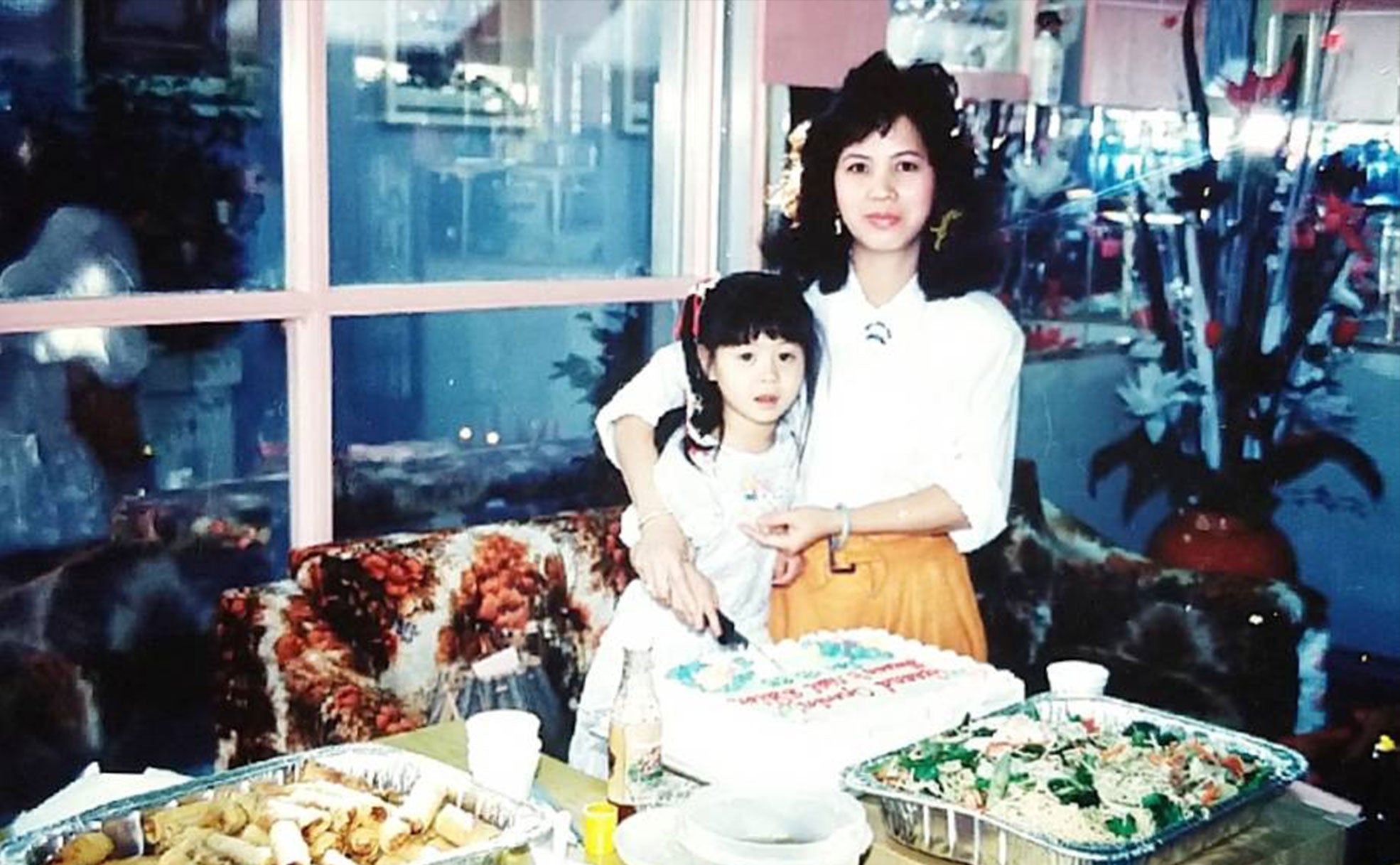
Susan Lieu's Debut Memoir: The Manicurist's Daughter
Susan Lieu, a performing artist, playwright, author, and daughter of Vietnamese refugees, spent decades searching for answers following her mother’s death. Lieu lost her mother at the age of 11 from medical negligence during a plastic surgery operation. She uncovers painful truths during her journey of self-discovery and self-acceptance in her debut memoir The Manicurist’s Daughter releasing March 12.
Lieu, who comes from a family of nail salon workers, writes about her attempt at avenging her mother’s death as she tracks down the plastic surgeon who preyed on vulnerable immigrant women. She also writes about grief and healing, body image insecurities, and self doubt, especially as she pivoted her career to pursue the performing arts in her adulthood.
Lieu took steps towards a path in the arts that led up to her autobiographical one-woman play, 140 LBS: How Beauty Killed My Mother, which she wrote and performed on a national multi-city tour in 2019. The play is the foundation of her new memoir, The Manicurist’s Daughter, but the book dives even deeper into her story. A multi-city book tour will also accompany the book launch in the U.S.
The Manicurist’s Daughter has already been featured in Elle Magazine as one of the “The Best Nonfiction Books for 2024” and Thi Bui, author of The Best We Could Do, describes it as “A high octane roller coaster to healing.” You can preorder the book here.
We couldn’t be more excited for the book launch and were inspired after chatting with Lieu. Read on as she recounts her emotional journey of finding herself and choosing to share her story with the world.
 Susan Lieu performing 140 LBS: How Beauty Killed My Mother. Photo Credit: Jenny Crooks
Susan Lieu performing 140 LBS: How Beauty Killed My Mother. Photo Credit: Jenny Crooks
What prompted you to share such personal experiences and a family tragedy publicly through your touring play 140 LBS: How Beauty Killed My Mother?
The true answer of why I even did the one woman show was that there was this dual track. One was like I really wanted to prove I wasn't a coward. I know I'm in my orbit on the stage. And I know I left that because I felt ashamed of not being good enough, doubtful that I was even talented. And also I didn't even feel like my story was even that important. I didn't feel like I had anything worthwhile to share as a performer for a long time. 140 pounds: How Beauty Killed My Mother was the fifth installment. So there were workshop shows up to that, like, it was this convergence of trying to figure out can I step into my own demons and explore this big self doubt I have around myself and never giving it to myself and working around that?
In addition to wow, I'm getting a lot of pressure to become a mom right now from my dad and my aunts. Am I even ready? How do I know how to be a mom if I never knew my mom? How will I also know what to do when I am a mom? Who will I turn to? And it felt so lonely to think about that, and so intimidating because up until this point, my sister already had one child. But it was just so hard to just talk about motherhood because that means we'd have to talk about my mom. But we hadn't for two decades. So I think putting on the shows was this convergence of my own self-discovery journey of what I'm capable of, and knowing where I come from and who that makes me in terms of motherhood and where I could go with that. So it was my own hero's journey to put on the shows.
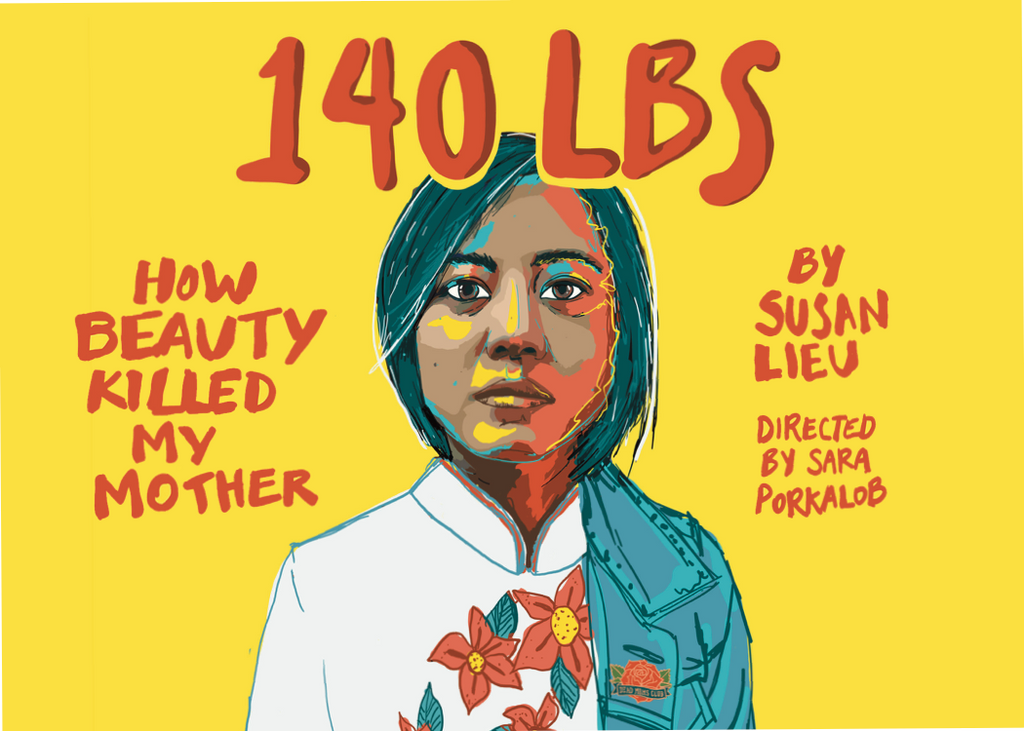 Poster for "140 LBS: How Beauty Killed My Mother" illustrated by Stacy Nguyen.
Poster for "140 LBS: How Beauty Killed My Mother" illustrated by Stacy Nguyen.
It was funny because when I got to this culminating show of 140 pounds, it exceeded my expectations. I was in collaboration with so many talented artists that I realized it and was able to tell the story of my family life in a way that I couldn't even see sometimes. It was through the work of these amazing designers that I was like, wow, it is a beautiful arc, right? So after I did that, I guess I'm done now. Right? But then it was actually just the beginning because then I started getting all this feedback from people who attended the show. And it was like that was cathartic for you? Well, it was cathartic for me. And so I didn’t know, through my own journey around vulnerability and investigation, and tending to my own inner child that I was actually doing a service for other people to create a container for what I call therapeutic theater, for them to look at their own pains and hurts. It was a reflection, it was a mirror and it was like a community container. And then that's when I realized that this was bigger than me, and that it was healing for me and it was healing for others. And then there was perhaps a future in it.
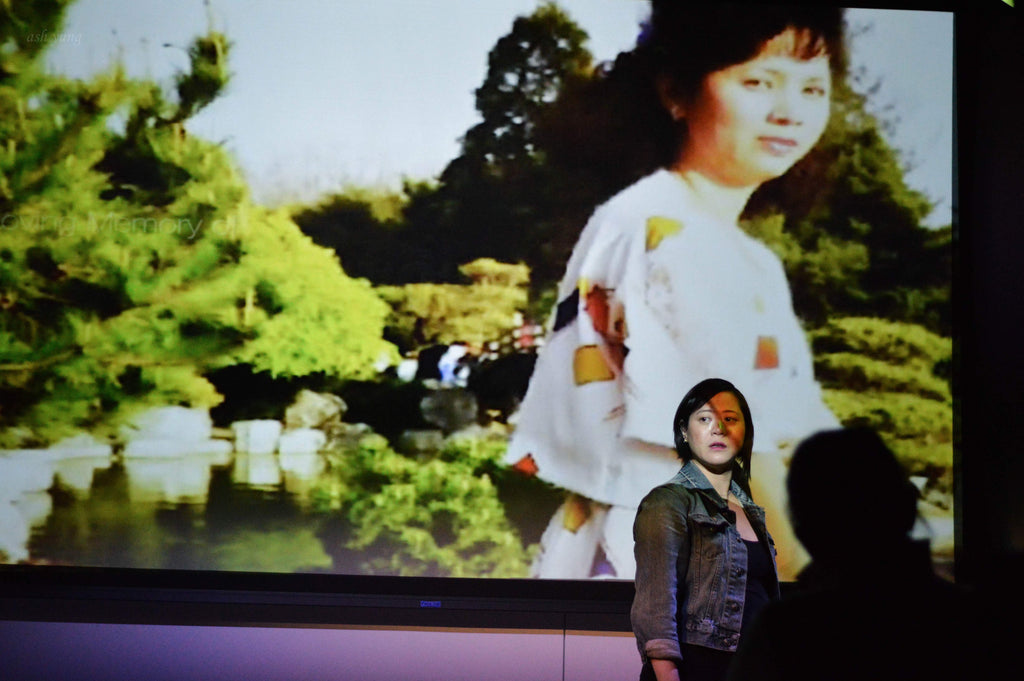 Susan Lieu performing 140 LBS: How Beauty Killed My Mother. Photo Credit: Ashley Yung
Susan Lieu performing 140 LBS: How Beauty Killed My Mother. Photo Credit: Ashley Yung
What was your process in writing this book and the research that went into it?
I wish I was the writer that had outlines and the objective of the story but I am not a planner in that way. It started off with a whole bunch of post it notes. To prepare for pitching a book, you have to create a chapter outline. And so there's all these chapters and thoughts. Originally, this memoir was going to be a series of essays not interlinked together. I tried it that way, and it wasn't working. And then my editor was like, “Just go back to your show! There's no through line!” I was like, “What's the through line,” even though it was so obvious in the show. The act of writing it out like in a container of a show is 65 minutes. There's really quick dialogue and I've got to advance you to the next scene, boom, boom, boom, boom. Writing a memoir, you get so much more time and space to lay out every detail. So part of the craft of writing is like, what's in and what's out. So I have a whole bunch of post it notes where I just had a lot of ideas or very vivid stories. I think as an ambitious, anxious, perfectionist, doing the thing is also really hard and scary, because it's like am I ever gonna get it? Is it ever going to be good enough? But writing itself is its own journey of peeling the layers of the onions.
The final product is about 320 pages but I wrote like 1200 pages before fine tuning. There were lots of floating ideas. And it got to a place where I was going nowhere. So I hired a book doctor. That's not a ghostwriter but someone who is like an emotional therapist through it all, but also is an editor. She'd highlight different sections I’d write and be like, “Oh, I have follow up questions here. Let's talk about that.” That helped me. She really took the time to be with me as I was doing my own self discovery process around it.
And I would say as an extrovert, during the pandemic, writing this memoir, I also went back to my fan base and asked them for help. I did live readings of work in progress so that I would have real deadlines so that I could get my shit together. And also, when I would read it out loud, because I'm a performer, I could see what [the editors] were talking about. I'm not a natural born writer or whatever. But I had a compelling story to tell and I think it took my own reflection, my own realization that I needed community in this process to do it. That I needed a certain type of support to help me do this because I was getting nowhere by myself.
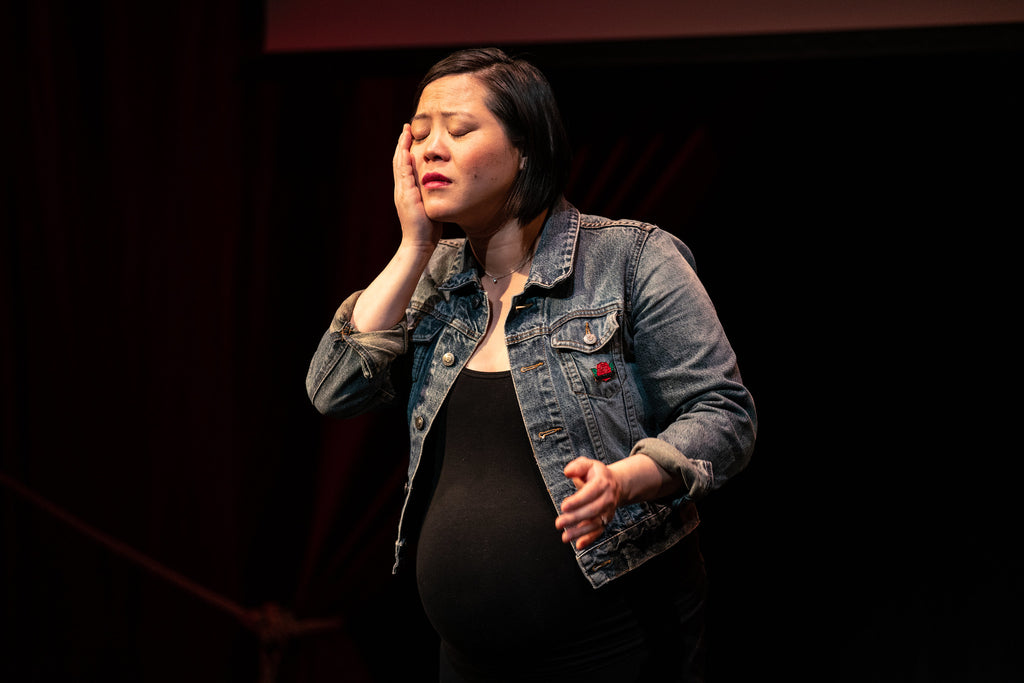 Susan Lieu performing 140 LBS: How Beauty Killed My Mother. Photo Credit: Jenny Crooks
Susan Lieu performing 140 LBS: How Beauty Killed My Mother. Photo Credit: Jenny Crooks
How did you know what parts of the story to include and exclude?
It was a very overwhelming time to write because there's so much to include and, or who's going to be offended or what should I exclude so the people are not really mad at me. So I did a lot of research. My dad at one point didn't want to talk about it anymore, so I started leaning more on my aunt.
I think one thing that was really important to me to talk about the Vietnamese American identity was to write in Vietnamese and have dialogue in Vietnamese. Man, following up on checking, spelling, grammar, colloquialism… I went through three translators to do that, making sure I got my mom's name right, because she had a weird history with her name changing over time. There was so much that I had to do and double and triple check. That was actually probably the hardest part, making sure I got the Vietnamese right because I'm sure people will find errors. But that's the thing about language, right? Part of this was rural Vietnamese in the 70s and 80s. This is how my parents spoke. And that's what they brought to America. So it's not reflective of Vietnamese-Vietnamese, and it's 2020s now, right? And that's who I would be working with - Vietnamese academics who speak that Vietnamese and that are extremely educated and not from that region.
And so, part of it is, I think on a craft level where I’m trying to make a decision where, intuitively I know that's going to be the right way, or to be reflective of my position in the story, which is my Vietnamese sucks. Susan's Vietnamese is not going to be perfect and being okay with that. So I mean, I think there's stuff just around craft, like how do I make this a page turner? And then how does the food just make you feel? Is that tasty? And then also did I represent my culture well? And did I also represent myself honestly of where I am positionally, too. And so there were just layers of editing and drafting to get to that place. I would say, in total, the book was like nine drafts. But when you think about it, I had five shows or six shows leading up to that. And each of those scripts had drafts too, so I think I have counted it at 38 drafts to get to here.
What do you hope to achieve from sharing your story?
I hope it encourages people to be tender with what is hurting inside. And that you get some space to reflect on you and your relationships and what needs to be said and not said.
There’s a mantra you say to yourself “I see pride, I see power, I see a bad-ass motherfucker who don’t take shit from nobody” that was borrowed from the move Cool Runnings. Do you still say that to yourself?
I remember, the copy editor was like “Um, FYI, this is actually not exactly what was said in the movie [Cool Runnings], and you actually kind of changed it.” And I didn't realize that. So I made it my own and she's like, “Okay, that works.”
I've been going on industry book talks like the California Independent Booksellers Convention and the Pacific Northwest Booksellers Convention. And I have to do a talk for like five to ten minutes and get on stage. And you might think I've performed for 65 minutes, so what's the big deal? I still have to hype myself up in the bathroom, and it sucks when it's a public bathroom. Trying to say it really quietly but say it to myself. Recently, I was doing some event where I said it and I don't know if it's growing up Asian American and wondering, “Do I deserve that? Do I get it too? Am I worthy enough?” But I do have to say these things for me to know that I rightfully get to tell my story. I deserve to be on stage. I am interesting and entertaining. And I do have a story to talk about, I have something to say. I don't feel that way all the time. My family certainly never made me feel that way. Which is part of the whole reason why I had to read this all in the first place, which is family secrets can eat you alive. And if we don't take care of those things, you're gonna pay the toll somewhere. We are always paying a cost somewhere. And if it doesn't happen here, it's gonna manifest somewhere else.
And so I think, for me to say that Cool Runnings line to myself to hype myself up is to tell inner child Susan, I do believe in you no matter what our family has said. And my family has certainly come around over the years, like definitely two siblings are quite supportive. But I don't feel like I was conditioned from a young age to feel proud of myself or to believe in myself. It was to fall in line, right? It was to be the supporting character, to be the smart girl, to be the girl with the flat nose; it was never I'm the main character, I grew up in a predominantly white town, and it was like I never felt that worthiness. And I've learned in life that sometimes people will give it to me and other people will not. But actually, what has stuck over time is me continually giving it to myself. Because I easily forget the kind words and I remember the harsh ones, but the more I can keep cultivating it within myself for myself by myself, I think that's where this longevity will be, is through my own knowing without the attachments of others.
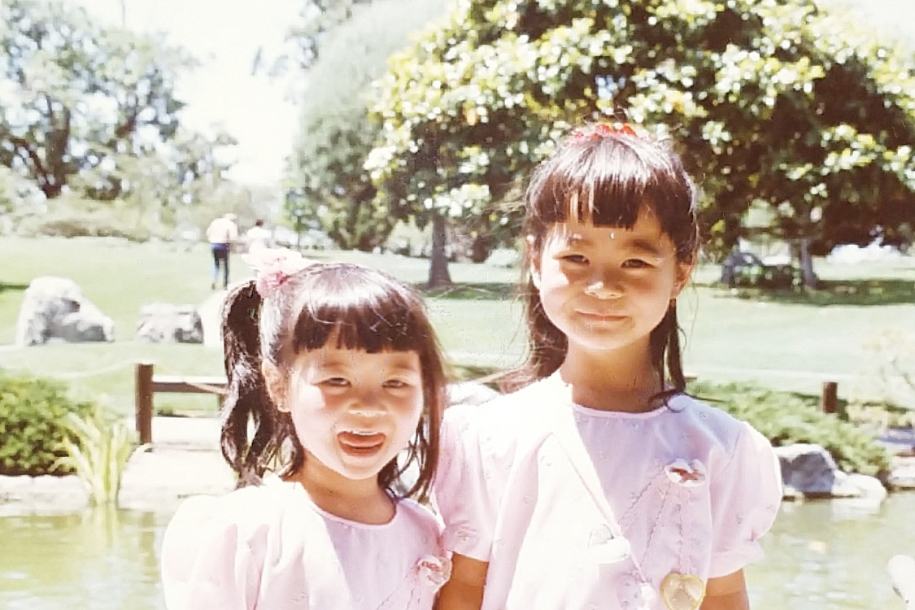 Archival photo of Susan Lieu and her sister.
Archival photo of Susan Lieu and her sister.
What advice do you have for those who are looking to pursue the arts, especially if they started in a different field like you?
Just start. Just start small. I think there is an attachment to achievement. I was so intimidated a long time ago, when I was like if I'm going to start putting stuff up on YouTube, if I don't get a lot of views, or followers, then I'm going to know that I'm a piece of shit. And I should stop. And I don't deserve this. And I think there’s so much about the ego around being enough, but it can get in the way of even starting and cultivating. And I liken this to a very tiny plant, like a seed you've just planted. You can't just douse on all the water, and then be like, boom, where's the plant? It is a living organism, your creativity. And you can only water it so much and note and observe. It's a very delicate process to tap into your artistic self. And I think we all have that.
One thing that I did for me when I had writer's block is I started doing The Artist's Way. It's a book and a 10-12 week program. And basically you do morning pages, which is three pages of journaling in the morning and then for 10 weeks, you read the chapter with that week and you always go out on an artist state. So you feed that inner voice inside of you of what you want to do. And I remember on one of my first artist states, I just wanted to walk around in the local cemetery. It's fucking weird as fuck, right. But I really wanted to do what I wanted to do. And I think it's like reclaiming of the inner voice, the facing of the demons, and then taking small risks and starting to really cultivate the listening of the voice and giving strength back to that inner voice because it's been probably shut down over the years by other people or likely your family. So that's the first thing I'd say, start.
I've gone through periods where I felt very rejected from being an artist. I remembered at Harvard, my classmates were SAG actors. They were union card carrying members. And I was like, I'm so late to the game. These girls and boys have already been stars in middle school plays. Who am I to think that I could be a somebody to even try these things? And I think for a long time, I felt very behind. Even when I was doing stand up comedy, one of my best bits was tiger mom. And I would do it with the Vietnamese accent and it was very dumb, dumb jokes. It was like about getting A's versus B's or something about never being enough. It was kind of funny, but it wasn't very good writing. But at least I was trying, you know, and, and if anything I learned, why don't I like that. My point in all that is there's a lot of value to experimentation. And even if you don't get a million views, maybe you learn something, or maybe you unleash something, or maybe you water the plant a little bit more to grow for the next day. And I think that's what it is. It's about incremental exploration and experimentation.
But I think in our highly overstimulated society now, we don't reward that. It took you how long you know, or what do you have to show for it? And I think the artistic process is actually so internal. That it feels contradictory to the process itself, because you're like, am I gonna make it? You know, like, am I gonna get a special and it's like, whoa, like, do you even know your why, of what you’re doing and what you want to explore?
I think through my art, I was able to find outlets for activism for changing a medical malpractice law in California so that other people can stay safe. I was able to create spaces to talk about intergenerational trauma and unresolved grief and mental health stigma. I finally am doing everything I've ever wanted to be at this intersection of creativity and social justice and entrepreneurship. Because I've carved out my niche for myself, because I've also dug deeper into the truth of my why I do this. And I think that takes time to really understand the what and the why. It's really just your own self-discovery journey of learning about yourself. I think it’s that in itself is its own lost art.
What does being a child of immigrants mean to you?
It means getting so much satisfaction when I get a deal. It's finding joy in the hustle. It's finding gratification in the deal. It's knowing that it can only get better. it's knowing that we've been handed a gift.
 Archival photo of Susan Lieu and her family.
Archival photo of Susan Lieu and her family.
Are there any events related to your book launch that you'd like to share?
The whole [book] tour. I'm gonna be on tour from mid March until May. I've got my book launch on March 12 in Chinatown, Manhattan at 7:30pm at New Design High School. And the San Francisco one, we're going to do it at this big theater in Chinatown and it is going to be a rollicking event.
You know, you've been to book talks, and then you come to my book talk, I hope it to be all of these events. To be an emotional roller coaster where we feel really in community. And I would love for that to be like a healing space as a collective. So the big tour is everything I want people to know about.
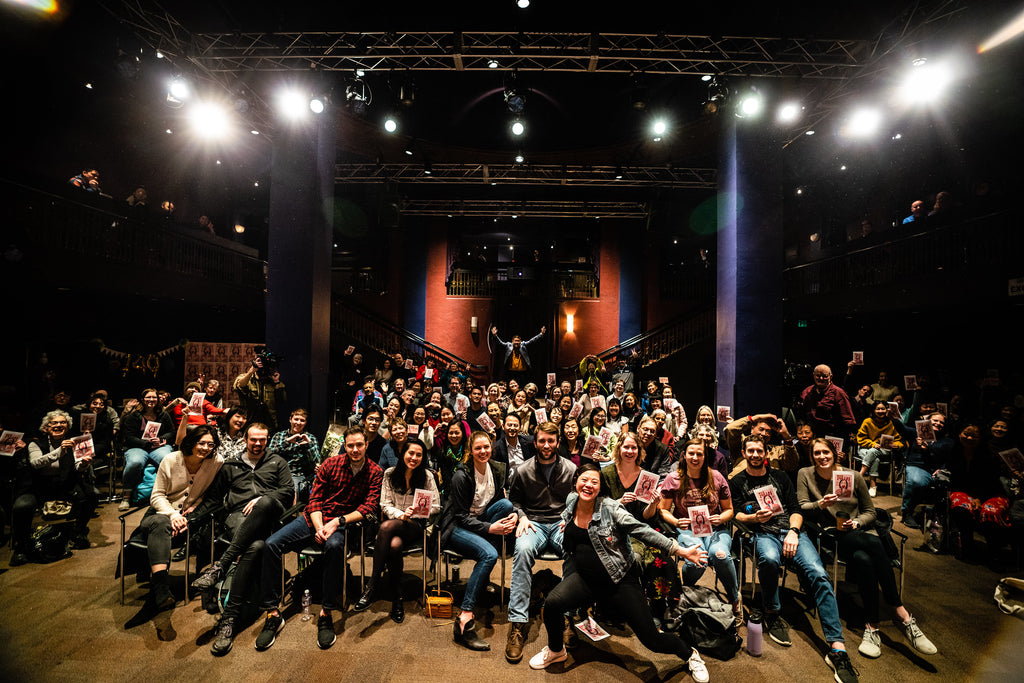 Photo of Susan Lieu and her audience at one of her live performances.
Photo of Susan Lieu and her audience at one of her live performances.
Preorder your copy of The Manicurist’s Daughter releasing on March 12 here and request for it at your local library. You can also catch Lieu on her book tour starting on March 12. Visit susanlieu.me for tour dates and info and follow her on Instagram at @susanlieu.